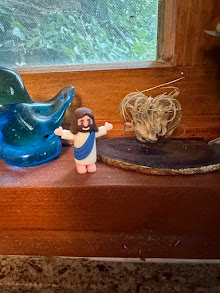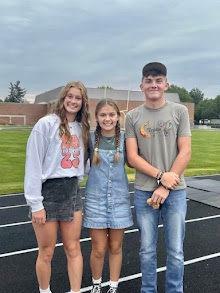Down through the clouds we come, gliding in over a green and silver land. We've left gray northwest Missouri like Dorothy blew out of Kansas. Now we're getting ready to drop down into Oz. The houses have tile roofs and line serpentine streets. From the air the developments look as organic as the river. There is no scrub, no waste. The country is either homes or farms. No, Toto, we're not in Kansas anymore. We're in northern California.
From the start, our trip north through Butte county is a tutorial and a mystery. We drive between flooded paddies full of waterfowl. The land is low and partitioned; periodically we pass a bin site or elevator with identifiable farm machinery. We also pass green fields and fields with hipped rows. What's going on here? Its not clear to us Midwesterners.
Then, of a sudden, the grain fields are replaced by trees as if the Entwives had come down from the mountains and planted acres upon acres of beautifully regimented orchards. The trees are of all ages: spacious plantings of spreading branches, graceful and aged. Younger orchards have seen mechanical pruning and high density planting; the rows march into the distance until perspective meets in a point. I don't know what all these trees are: we look for clues in an occasional processing plant, or wooden crates, or, most helpful of all, a real sign. Diamond. Sunsweet. Nothing is blooming this early in February but everything points to spring. I have never seen this many trees in cultivation, this many acres of orchards. I can barely imagine the sight and sounds of these orchards in bloom.
Over the weekend we walked through the Farmers' Market in San Francisco. The sun came out and the aisles overflowed with greens of all heritages, cheeses of all hues, fungi and fruit, oils and meats. A paintable still life waited at every booth. Human comedy played out in a street musician warbling 'Twinkle, Twinkle on his clarinet for a little girl or two guys with manual typewriters selling instant poetry. All the world a stage or movie set with the water as backdrop, the street cars as foreground and each vendor's booth with the most artful depiction of his wares. Do you want an aubergine eggplant spread? Do you need the creamiest blue cheese? Wait in line for the oyster bar to open at eleven.
Or how about a $22 pear galette?
As art, as entertainment, the market can't be beat. Even the folks making purchases were compelled to carry their goods in handwoven baskets, not the ubiquitous plastic sack. We're not really buying supper; we're the extras in a movie. Its fun, but its not real.
Most of the vendors display signs letting us know how very local they are, the acreage of their farm, the distance from San Francisco, how long their business has existed. We were told the market was using this as advertising; do you think people buy or refuse to buy their lunch based on the distance from home? I only know the many assorted greens were looking pretty wan by midday, no matter how short their trip from the field.
Soybeans were notable by their absence; only one booth offering tofu. Clearly most people will indeed purchase tasty meats if they meet the proper production criteria. On the other hand, someone had a large menu offering 'Core Elations', self defined 'highly vibrational culinary creations'. Hmmmm. I would definitely need labeling for those dishes.
What's the bottom line I bring home from exotic California? That it is a marvelous land, growing a wide and bountiful number of the food crops we enjoy on our table. Many of these we in the Midwest can never grow, even in the most plentiful days of summer gardening. No wonder the Californians are in the forefront of the local food movement; they can, every day of the year! At least in San Francisco. I'm sure the folks at the Safeway in Chico, or Gridley, or Biggs, buy many of the same brands I purchase for our supper in Tarkio. Though surely they have an olive bar, something I covet for evening cocktail hour. It is difficult for me to picture the shoppers at the Ferry Market getting together for a barbeque on Labor Day of organic ($8.99/#) ground beef, baked beans $6.99/#), and chips. Would their burgers and chips taste better than mine?
Secondly, this concentration and even obsession with natural is in such contrast with the agricultural situation in much of California. To all appearances, food producers have to jump through many more hoops to work their magic with soil, seed, and water. The fantastic engineering feats of the past are works of art, directing each drop of water to its best use, multi-tasking with regard to water fowl, gathering the waters for energy and flood prevention, and pumping what's left to the top of the system and using it again. From the airplane or the top of a butte, the network of ditches, pumps, reservoirs, levees and rivers is as great an accomplishment as Roman aqueducts of past civilization. Yet this system is constantly undermined by the demands of folks worried about the health of the natural ecosystem and assorted creatures in that system. After flying over and traveling through some of California, I can only wonder who declares what the "natural" ecosystem is? Here in Missouri, someone squinting at our gray February fields can easily imagine the silhouette of the prairies that preceded our fields of grain. A couple of years out of cultivation and our landscape looks like Lewis' journal. But who is going to return California to its ancestral landscape? And once that arid Eden is redeemed, what will happen to the producers of the beautiful foods at the Ferry Market? What will they grow? And who will they sell it to? If we shift the balance in favor of some unimaginable natural ideal, who will grow the almonds and walnuts for export? What will happen to those beautiful orchards?
What more lovely landscape are we seeking than that which currently exists? Something without the hand of man visible? What if there were no rice fields, corn fields, dairies, orchards? What if there were no gardens? Or pastures? Even the nomads of our ancestry grew dates at the oases. Not only would we be hungry physically, we would be starved aesthetically. And that would be hungry indeed.




















No comments:
Post a Comment